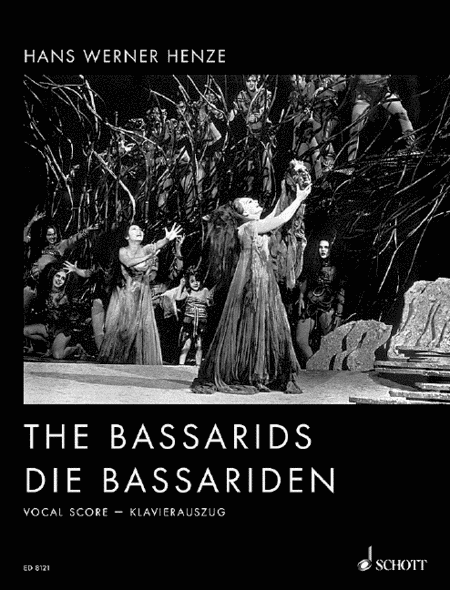Digital Download SKU: S9.Q49517 Music Drama in One Act. Composed by Hans Werner Henze. This edition: vocal/piano score. Downloadable, Piano reduction. Duration 120 minutes. Schott Music - Digital #Q49517. Published by Schott Music - Digital (S9.Q49517). English • German.Revidierte Fassung (1992) Orchester : 4 (2. mit B-Fuss, 3. auch Picc., 4. auch Altfl. u. Picc.) * 2 * 2 Engl. Hr. * 4 (3., 4. auch Altsax., 4. auch Es-Klar.) * Bassklar. (auch Altsax. u. Tenorsax.) * 4 (4. auch Kfg.) - 6 * 4 (4. auch Basstrp..) * 3 * 2 - P. S. (3 Kuhgl. * kl. Trgl. * hg. Beck. * Beckenpaar * 3 Tamt. * kl. Tr. * Mil. Tr. [m. u. o. Schnarrs.] * 3 Tomt. * 3 Bong. * Holztr. * gr. Tr. [mit oder ohne Beck.] * Mar. * Peitsche * Ratsche * Metallbl. * Glsp. * Xyl. * Vibr. * Marimba * Fingerzimb. * Rohrengl.) (8 Spieler) - 2 Hfn. * 2 Klav. * Cel. - Str. Auf der Buhne: 4 Hr. (auch durch Trp. im Orchester ersetzbar) * 2 Git. * 2 Mand. * 3 Kuhgl. Revidierte und reduzierte Fassung (1992) Orchester: 4 (2. mit B-Fuss, 3. auch Picc., 4. auch Altfl. u. Picc.) * 2 * 2 Engl. Hr. * 4 (3. auch Altsax., 4. auch Altsax., Tenorsax. u. Bassklar.) * 4 (4. auch Kfg.) - 4 * 4 * Basstrp. * 3 * 1 - P. S. (3 Kuhgl. * kl. Trgl. * Rohrengl. * hg. Beck. * Beck. * 3 Tamt. * 3 Tomt. * Tamb. * Mil. Tr. [m. u. o. Schnarrs.] * 3 Bong. * Holztr. * gr. Tr. [mit oder ohne Beck.] * Mar. * Peitsche * Metallbl. * Xyl. * Vibr. * Mar.) (8 Spieler) - Hfe. * Klav. (auch zu 4 Hd. ad lib.) * Cel. * Mand. - Str. Hinter der Buhne: 4 Trp. (auch durch Trp. im Orchester ersetzbar) - Git. * 2 Mand. - 3 Kuhgl. (ad lib.) Prolog (ad lib.): Dionysus * Tenor - P. S. (Legno * gr. Tr. * Vibr. * Marimba) - Hfe. * Klav. - TonbandRevidierte Fassung (1992) Orchester : 4 (2. mit B-Fuß, 3. auch Picc., 4. auch Altfl. u. Picc.) · 2 · 2 Engl. Hr. · 4 (3., 4. auch Altsax., 4. auch Es-Klar.) · Bassklar. (auch Altsax. u. Tenorsax.) · 4 (4. auch Kfg.) – 6 · 4 (4. auch Basstrp..) · 3 · 2 – P. S. (3 Kuhgl. · kl. Trgl. · hg. Beck. · Beckenpaar · 3 Tamt. · kl. Tr. · Mil. Tr. [m. u. o. Schnarrs.] · 3 Tomt. · 3 Bong. · Holztr. · gr. Tr. [mit oder ohne Beck.] · Mar. · Peitsche · Ratsche · Metallbl. · Glsp. · Xyl. · Vibr. · Marimba · Fingerzimb. · Röhrengl.) (8 Spieler) – 2 Hfn. · 2 Klav. · Cel. – Str. Auf der Bühne: 4 Hr. (auch durch Trp. im Orchester ersetzbar) · 2 Git. · 2 Mand. · 3 Kuhgl. Revidierte und reduzierte Fassung (1992) Orchester: 4 (2. mit B-Fuß, 3. auch Picc., 4. auch Altfl. u. Picc.) · 2 · 2 Engl. Hr. · 4 (3. auch Altsax., 4. auch Altsax., Tenorsax. u. Bassklar.) · 4 (4. auch Kfg.) – 4 · 4 · Basstrp. · 3 · 1 – P. S. (3 Kuhgl. · kl. Trgl. · Röhrengl. · hg. Beck. · Beck. · 3 Tamt. · 3 Tomt. · Tamb. · Mil. Tr. [m. u. o. Schnarrs.] · 3 Bong. · Holztr. · gr. Tr. [mit oder ohne Beck.] · Mar. · Peitsche · Metallbl. · Xyl. · Vibr. · Mar.) (8 Spieler) – Hfe. · Klav. (auch zu 4 Hd. ad lib.) · Cel. · Mand. – Str. Hinter der Bühne: 4 Trp. (auch durch Trp. im Orchester ersetzbar) – Git. · 2 Mand. – 3 Kuhgl. (ad lib.) Prolog (ad lib.): Dionysus · Tenor – P. S. (Legno · gr. Tr. · Vibr. · Marimba) – Hfe. · Klav. – Tonband.
